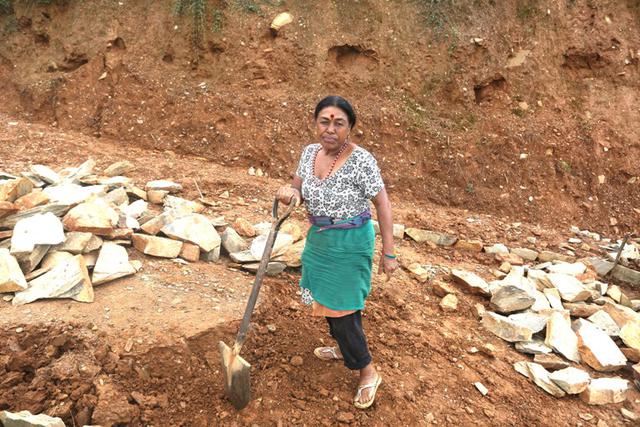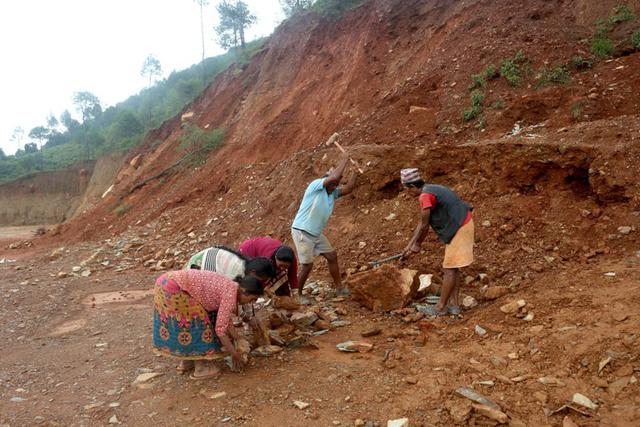In a monsoon morning, almost 60 kilometers away from Nepal's capital Kathmandu in Sindhupalchowk district, nearly 50 people were constructing rural road in Indrawati village council earlier this week. Ignoring the weather and forgetting about the global pandemic COVID-19, locals were carrying and arranging stones on the road in Sipatar village located on a hilltop. They didn’t carry any fear of the virus infection on their face, but only energy and willingness to work more.
56-year-old Shanti Shrestha was one among the workers involved in Prime Minister Employment Program. Shrestha, a single woman, feels glad to be able to work and earn even during the global crisis. "My husband died before few years, my only daughter is already married. I didn’t have any income for bread and butter, this job has become my only livelihood option," Shrestha shared while fetching stones from few meters away.
Before moving back to the village, she lived in the capital city Kathmandu for a couple of years after her husband's death. "I used to sell the daily essentials like cigarettes and chocolates on the road side. But, it wasn’t good either. It was difficult to pay the rent and get a decent meal, so I decided to get back to own village, "She recalled the past.

Shrestha's home was damaged during the earthquake of 2015 alike other houses in the whole village. She received the amount of Rs 300,000 from the government for reconstruction of house, which has recently been completed.
While questioned upon the physical labor and difficulties in the construction work, she rather feels proud to be able to work as men. "Work is work, no matter for men or women. I earn Rs 700 per day, which helps me buy necessary goods. I am satisfied, "she expressed, adding that the only concern is it's a temporary job.
Every worker in the project has similar sufferings. Their houses were damaged in the earthquake, some have lost family members, some have been jobless due to COVID-19 crisis, but carry a similar aspiration to work in own village.
50-year-old Ghiumaya Tamang had a similar story to share. Her husband, who was severely injured during the earthquake of 2015, died in course of treatment later.
"Though I have never worked in construction works before, I decided to take upon this job. I receive good income which has eased my life. I paid some local loans too. I don’t find it difficult to do the labor work as men. We all work together like a family," Tamang shared with APD.
Her only son used to work in a private office in Kathmandu, but is jobless now due to COVID-19. "My son is back from the city few days ago. He is looking after the farm and production, which is too low. He is not sure about the future job. I wish he could work in village too, but there are no jobs," she added.

Shrestha and Tamang are joined by other local women of similar age. Being in 50s, they don’t hesitate to do the physical tasks, which are often regarded as men's' job in the South Asian country. Defying traditional gender narratives, these women demand more works in order to live a decent life.
This employment program has been implemented by the local government and supported by the United Nations Development Fund (UNDP). According to UNDP, over 2,000 women and men – especially the poor, vulnerable and the most-affected daily wage earners and migrant workers – are getting short-term employment in 11 of the most affected municipalities in Sudurpaschim, Karnali, Gandaki and Bagmati Province.
Indrawati village council located in Bagmati Province is one of them.
The projects are focused on the rehabilitation, construction, or improvement of community infrastructure, such as irrigation canals, drinking water system, and rural roads.
According to Babu Ram Lama, Chairman of Indrawati Village Council Ward-9, around 50 workers are engaged in the 600 meters long road soling works between Lamatol and Budichour. Workers were mostly selected from vulnerable groups and poor families.
"The recruitment process was done on the basis of financial status of families. We have mostly employed single women, jobless returnees from capital and those from poor families and Dalit community. There are two construction sites in our ward," Lama told APD on the site. "The project will last for at least 40 days; it has provided a great relief to the locals."
"We have encouraged women to join, and I am very happy to see their active participation and contribution in development works," Lama added.
There are over 500 households in the ward with a population of around 2,800. At least 20 percent of villagers worked in Gulf and the Middle East, among which many are expected to return due to COVID-19 crisis, few are already back.
Amid such, generation of employment for foreign returnees has been a major challenge for many village councils like Indrawati. "We are planning to launch an employment program from the village council level. We want to mobilize the returnees in physical infrastructure construction, agriculture, irrigation works," Lama informed.
Melamchi Municipality shares the same crisis. At least 1,900 people from across the municipality are migrant workers based in different countries except India, among which at least 1,000 are expected to return due to the ongoing crisis. 42 migrants are already back in the repatriation flights.
Dambar Bahadur Aryal, Mayor of Melamchi Municipality, shared that they are planning to launch agriculture and livestock related programs to engage the returnees.
"We have provided short-term jobs to at least 2,100 locals, both men and women, mostly from poor families and unskilled workers. They are working in different areas like road, waste management, bus parks, drinking water, irrigation among others," Aryal shared. "Now, our focus in on foreign returnees, first we will consult with them and launch suitable work packages."
Various development partners have joined hands in the government's effort to create more livelihood options for the people who have been hit hard.
According to UNDP, some 4.4 million people are engaged in the informal sector and the sources of their livelihood are halted. To add to this, hundreds of thousands of migrants are returning and will be looking for jobs and to reintegrate into society. Those in the informal sector are the hardest hit by the impact of this pandemic and this calls for immediate attention.
Ayshanie Medagangoda-Labe, UNDP Resident Representative in Nepal, told APD, "At UNDP, we have repurposed our programs and want to scale up, to create more employment and livelihoods opportunities, help those returning to deploy their skills and adjust to the new situation. Importantly, we want to make those jobs and livelihoods consistent with sustainable and green development to protect natural treasures."
She further stated that the first priority is health, and to remain healthy and safe, one needs to follow safety measures."But you also need to have a source of income. Unfortunately, for millions of people this is a real challenge--particularly for the most vulnerable who are dependent upon daily incomes and with little access to safety nets," she remarked.
